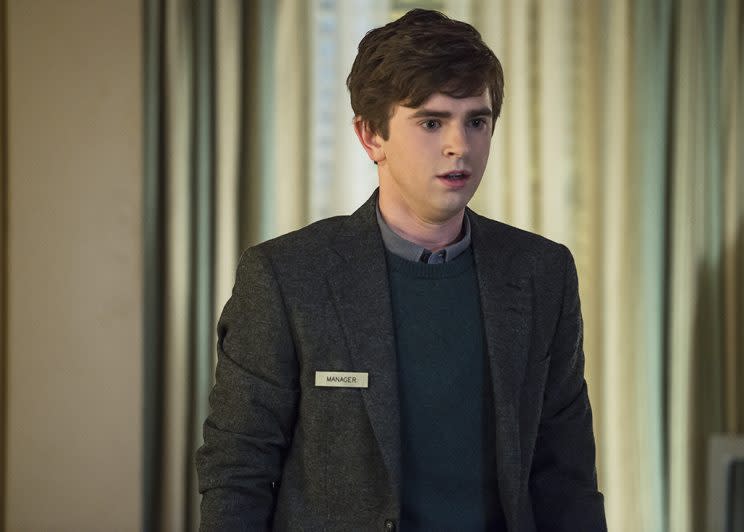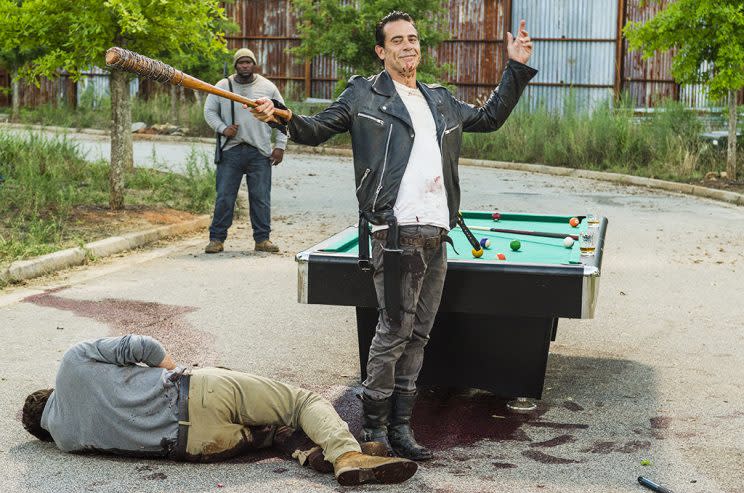‘Bates Motel’ Postmortem: Producers on the Rihanna Arc Twists, Including the One That Shocked Them
Warning: This interview for the “Marion” episode of Bates Motel contains spoilers.
You didn’t really think they were simply going to remake the Psycho shower scene, did you? Instead, Bates Motel creators and showrunners Kerry Ehrin and Carlton Cuse put a clever, satisfying twist on that classic movie death scene, sending guest star Rihanna’s Marion Crane off to a new life — and making her married boyfriend, Sam Loomis (Austin Nichols), meet his grisly death via Norman Bates’s knife.
Ehrin and Cuse talked to Yahoo TV about the twist and the major changes Norman experienced during the two-episode Psycho homage arc. They also learned about an interesting twist themselves regarding guest star Nichols.
Yahoo TV: Norman tells Mother he knows he’s mad in the “Mad Hatter” sense of the word, but that plenty of mad people are able to function, some as heads of state. Was that a preelection or postelection line?
Kerry Ehrin: What do you think?
In “Marion” and last week’s episode, Norman has learned so much about the relationship between himself and Mother. Would you characterize them as being at war with each other?
Ehrin: Not exactly. I would say it’s more like a new deal between them. It’s like they’re trying to figure out what the roles of the relationship are, but while there’s a lot of underlying fears of trust and control, it’s like two mob bosses trying to say, “Oh, we’re going to work together now.” But what does that actually look like?
The scene in the kitchen, when Mother forces Norman’s eyes open — that’s a new level of fighting for them.
Ehrin: It was really f***ing funny. It’s one of the joys of the show, that in the heat of horrible anger and frustration, these characters are ridiculous. They are ridiculously human. It’s like she just was pissed, and she wanted him to open his eyes, and she’s forceful. It’s a scene about control, and she wanted his eyes open right then, and he didn’t want to open them. Of course the result of that is just funny.

Despite this back-and-forth between Norman and Mother, he begins to make some of his own decisions, and he ultimately tells Marion to get out. She thinks he’s telling her this only to help her get away from her situation. He’s, of course, trying to save her from him. How is he able to stop himself from acting out against her long enough to encourage her to get away? Is it because, since he’s just become cognizant of this other half of himself and what it means, he still has a level of control?
Ehrin: Exactly.
Carlton Cuse: The character is not fully gone. That’s the descent that we’re charting over the rest of the season of the show. I think there’s a real poignancy to that moment where Norman recognizes that he is capable of doing things beyond his control, and it’s an act of love and mercy to tell Marion to get out, even though she doesn’t understand. She just thinks he’s rejecting her.
Ehrin: Also, just in terms of basic psychology, it’s like knowledge of yourself and of your behaviors gives you the ability to change your behaviors. He has just had this avalanche of knowledge and understanding that he’s worked through throughout these episodes, so he’s digging deep inside of himself to try to control these impulses, because he understands them more.

In the end, I think we have a sense they’ve definitely bonded. It’s brief, but I would say it was a real friendship, some understanding on both sides of each other. I think we get a sense that Marion will be OK. She’s been hurt a lot, she’s been through a lot, but she knows how to survive. And she has some instincts that maybe were even strengthened a bit by her brief time with Norman.
Cuse: We felt like the character that Janet Leigh played in the original movie was very much a woman of that time. We thought that that woman, though, was way too passive and ultimately ends up as a horrible victim. That just didn’t feel right for our telling of the story. We wanted our character to be much more empowered, and I think the ending that we came up with for Marion Crane was one that, as you said, has her much more in control of her own destiny.

Sam, on the other hand… When you filmed the ending for him, the shower scene, or when you cast Austin Nichols, did you know that his Walking Dead character was also going to be stabbed to death?
Ehrin: No!
Cuse: No. Absolutely not.
Ehrin: That’s amazing.
Did you talk about it at all, once you were actually filming, or did he know about his TWD death at that point?
Ehrin: No. We never discussed it. We didn’t know. You’re breaking this news to us.
Yes, his character was disemboweled on The Walking Dead.
Ehrin: Oh my God. Poor Austin. What a year.
Cuse: Neither of us watch that show, so no, that’s too bad for him, but… two good shows. Getting disemboweled isn’t the worst thing to get a chance to work on.

Sam dies on the very shower curtain that his wife sold to Norman. Was that intentional? Because it’s a great little detail.
Cuse: It was more of an homage to the original movie. It had more to do with basically [director] Phil Abraham constructing a version of that sequence that was his own interpretation of the famous Psycho shower sequence.
Ehrin: I will add that the weaving in of a lot of these details from Psycho, weaving them in from the beginning of the season, getting the shower curtains through Madeleine — all that was very intentional. We wanted to thread Psycho through the season.
Bates Motel airs Mondays at 10 p.m. on A&E.
Read More From Yahoo TV:
‘Bates Motel’ Postmortem: Norman’s Shower Scene Victim on Recreating the Iconic ‘Psycho’ Death
‘Bates Motel’ Postmortem: Nestor Carbonell on Rihanna, Norman’s Realization, and Romero’s Revenge
‘Bates Motel’ Postmortem: EP Kerry Ehrin On Norman ‘Coming Apart at the Seams’

